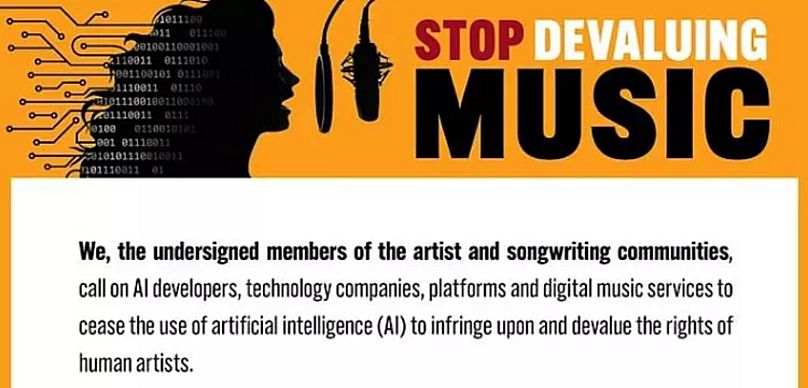30 Days/28: New Miss World crowned as controversy brews over Miss England accusations
- Nhận đường liên kết
- X
- Ứng dụng khác

SoundCloud updates AI policy after backlash: ‘AI should support artists, not replace them’

A new letter from SoundCloud CEO Eliah Seton states: "We don’t build generative AI tools, and we don’t allow third parties to scrape or use artist content from SoundCloud to train them either.” This follows a backlash after the platform's Terms Of Use were quietly updated in February.
Following controversy over a quiet update to the terms of use that seemed to permit the content uploaded to the streamer being used to train AI, SoundCloud has updated its AI policy.
Futurism had previously reported that SoundCloud “quietly” updated its terms and conditions in February 2024 in which users were “explicitly agreeing” by using the platform to have their content used to train AI.
The policy read: “You explicitly agree that your Content may be used to inform, train, develop, or serve as input to artificial intelligence technologies as part of and for providing the services.”
Users were understandably upset and now, following backlash, SoundCloud CEO Eliah Seton has responded regarding the platform’s stance on AI and “how content may interact with AI technologies within SoundCloud’s own platform”.
The letter, titled “A Letter from our CEO: Clarifying our Terms of Use”, states: “SoundCloud has never used artist content to train AI models. Not for music creation. Not for large language models. Not for anything that tries to mimic or replace your work.”
It also states: “We don’t build generative AI tools, and we don’t allow third parties to scrape or use artist content from SoundCloud to train them either.”
“Our position is simple: AI should support artists, not replace them.”
Seton went on to explain the updates to the Terms Of Use last February were meant to clarify how “we may use AI internally” to improve SoundCloud for its users, including “powering smarter recommendations, search, playlisting, content tagging, and tools that help prevent fraud”.
Now, SoundCloud has changed its Terms Of Use, and it will only use AI-training on content uploaded to the platform with users’ consent.
The new policy reads: “We will not use Your Content to train generative AI models that aim to replicate or synthesize your voice, music, or likeness without your explicit consent, which must be affirmatively provided through an opt-in mechanism.”

Today, the Data (Use and Access) Bill returns to the UK House of Lords for consideration, in order to address how the government’s desire to foster a British AI industry could allow technology companies to circumvent copyright laws and use creative content to train their models – all without the permission of the creators.
Chi Onwurah, the chair of the cross-party committee, has previously urged the government to bring forward the AI safety bill.
Onwurah told the Guardian: “It’s absolutely critical that the government shows it is on the side of people when it comes to technology, particularly when it comes to the tech platforms and the impact technology is going to have in their lives.”
This also comes at a time when artists have been speaking out against companies exploiting copyrighted works and warning against “predatory” use of AI in music.
Earlier this year, more than 200 artists featured on an open letter submitted by the Artist Rights Alliance non-profit, calling on artificial intelligence tech companies, developers, platforms, digital music services and platforms to stop using AI "to infringe upon and devalue the rights of human artists.”
Amongst those names were Stevie Wonder, Robert Smith, Billie Eilish, Nicki Minaj, R.E.M., Peter Frampton, Jon Batiste, Katy Perry, Sheryl Crow, Smokey Robinson, and the estates of Bob Marley and Frank Sinatra.
The letter, while acknowledging the creative possibilities of new AI technology, addressed some of its threats to human artistry. Those include using preexisting work to train AI models - without permissions - in an attempt to replace artists and therefore “substantially dilute the royalty pools that are paid out to artists.”
The letter stated: “Make no mistake: we believe that, when used responsibly, AI has enormous potential to advance human creativity and in a manner that enables the development and growth of new and exciting experiences for music fans everywhere. Unfortunately, some platforms and developers are employing AI to sabotage creativity and undermine artists, songwriters, musicians and rightsholders. When used irresponsibly, AI poses enormous threats to our ability to protect our privacy, our identities, our music and our livelihoods.”
Vocabulary:
scrape /skreɪp/ to remove something from a surface by moving something sharp and hard like a knife across it.
explicit /ɪkˈsplɪsɪt/ clear and easy to understand, so that you have no doubt what is meant.
upset /ˌʌpˈset/ unhappy or disappointed because of something unpleasant that has happened.
mimic /ˈmɪmɪk/ to copy the way somebody speaks, moves, behaves, etc., especially in order to make other people laugh.
consent /kənˈsent/ permission to do something, especially given by somebody in authority
affirmatively /əˈfɜːmətɪvli/ in a way that means ‘yes’ or expresses agreementf
foster /ˈfɒstə(r)/ foster something to encourage something to develop
circumvent /ˌsɜːkəmˈvent/ circumvent something to find a way of avoiding a difficulty or a rule.
urge /ɜːdʒ/ to advise or try hard to persuade somebody to do something.
preexisting /ˌpriː ɪɡˈzɪstɪŋ/ existing from an earlier time
sabotage /ˈsæbətɑːʒ/ the act of doing deliberate damage to equipment, transport, machines, etc. to prevent an enemy from using them, or to protest about something.
rightsholder
irresponsibly /ɪrɪˈspɒnsəbli/ without thinking enough about the effects of what you do; without showing a feeling of responsibility.
livelihood /ˈlaɪvlihʊd/ a means of earning money in order to live.
Grammaly:
--------------------------------------------------------------------------------------------------
Following controversy over a quiet update to the terms of use that seemed to permit the content uploaded to the streamer being used to train AI, SoundCloud has updated its AI policy.
[Following controversy over a quiet update to the terms of use] cụm trạng ngữ
[Following] sau đó, sau khi, do có
[controversy over] sư tranh cãi về[over]
[ a quiet update] bản cập nhật âm thầm
---------------------------------------------------------------------------------------------
Futurism had previously reported that SoundCloud “quietly” updated its terms and conditions in February 2024 in which users were “explicitly agreeing” by using the platform to have their content used to train AI.
[its terms and conditions] cụm danh từ sủ hữu
[in which] trong đó, thay cho [tems and conditions
----------------------------------------------------------------------------------------------
The new policy reads: “We will not use Your Content to train generative AI models that aim to replicate or synthesize your voice, music, or likeness without your explicit consent, which must be affirmatively provided through an opt-in mechanism.”
[without your explicit consent] giới từ điều kiện, nếu không có sự đồng ý từ bạn
[which] thay thế cho consent
-----------------------------------------------------------------------------------------------.
Translate:
Following controversy over a quiet update to the terms of use that seemed to permit the content uploaded to the streamer being used to train AI, SoundCloud has updated its AI policy.
Sau tranh cãi về việc âm thầm cập nhật các điều khoản sử dụng dường như cho phép sử dụng nội dung tải lên dịch vụ phát trực tuyến để đào tạo AI, SoundCloud đã cập nhật chính sách AI của mình.
Futurism had previously reported that SoundCloud “quietly” updated its terms and conditions in February 2024 in which users were “explicitly agreeing” by using the platform to have their content used to train AI.
Futurism trước đó đã đưa tin rằng SoundCloud đã "âm thầm" cập nhật các điều khoản và điều kiện của mình vào tháng 2 năm 2024, trong đó người dùng "hoàn toàn đồng ý" khi sử dụng nền tảng này để sử dụng nội dung của họ nhằm mục đích đào tạo AI.
The policy read: “You explicitly agree that your Content may be used to inform, train, develop, or serve as input to artificial intelligence technologies as part of and for providing the services.”
Chính sách này có nội dung: “Bạn đồng ý rõ ràng rằng Nội dung của bạn có thể được sử dụng để thông tin, đào tạo, phát triển hoặc đóng vai trò là đầu vào cho các công nghệ trí tuệ nhân tạo như một phần của và để cung cấp các dịch vụ”.
Users were understandably upset and now, following backlash, SoundCloud CEO Eliah Seton has responded regarding the platform’s stance on AI and “how content may interact with AI technologies within SoundCloud’s own platform”.
Người dùng tỏ ra khó chịu và hiện tại, sau phản ứng dữ dội, Giám đốc điều hành SoundCloud Eliah Seton đã phản hồi về lập trường của nền tảng này đối với AI và "cách nội dung có thể tương tác với các công nghệ AI trong nền tảng của SoundCloud".
The letter, titled “A Letter from our CEO: Clarifying our Terms of Use”, states: “SoundCloud has never used artist content to train AI models. Not for music creation. Not for large language models. Not for anything that tries to mimic or replace your work.”
Bức thư có tiêu đề “Thư từ CEO của chúng tôi: Làm rõ Điều khoản sử dụng của chúng tôi”, nêu rõ: “SoundCloud chưa bao giờ sử dụng nội dung của nghệ sĩ để đào tạo các mô hình AI. Không phải để sáng tác nhạc. Không phải để làm các mô hình ngôn ngữ lớn. Không phải để làm bất cứ thứ gì cố gắng bắt chước hoặc thay thế tác phẩm của bạn”.
It also states: “We don’t build generative AI tools, and we don’t allow third parties to scrape or use artist content from SoundCloud to train them either.”
Tài liệu cũng nêu rõ: “Chúng tôi không xây dựng các công cụ AI tạo sinh và chúng tôi cũng không cho phép bên thứ ba thu thập hoặc sử dụng nội dung nghệ sĩ từ SoundCloud để đào tạo họ”.
“Our position is simple: AI should support artists, not replace them.”
Seton went on to explain the updates to the Terms Of Use last February were meant to clarify how “we may use AI internally” to improve SoundCloud for its users, including “powering smarter recommendations, search, playlisting, content tagging, and tools that help prevent fraud”.
“Quan điểm của chúng tôi rất đơn giản: AI nên hỗ trợ nghệ sĩ, chứ không phải thay thế họ.”
Seton tiếp tục giải thích rằng các bản cập nhật cho Điều khoản sử dụng vào tháng 2 năm ngoái nhằm mục đích làm rõ cách “chúng tôi có thể sử dụng AI nội bộ” để cải thiện SoundCloud cho người dùng, bao gồm “cung cấp các đề xuất, tìm kiếm, danh sách phát, gắn thẻ nội dung và các công cụ thông minh hơn giúp ngăn chặn gian lận”.
Now, SoundCloud has changed its Terms Of Use, and it will only use AI-training on content uploaded to the platform with users’ consent.
Hiện tại, SoundCloud đã thay đổi Điều khoản sử dụng và sẽ chỉ sử dụng đào tạo AI trên nội dung được tải lên nền tảng này khi có sự đồng ý của người dùng.
The new policy reads: “We will not use Your Content to train generative AI models that aim to replicate or synthesize your voice, music, or likeness without your explicit consent, which must be affirmatively provided through an opt-in mechanism.”
Chính sách mới có nội dung: “Chúng tôi sẽ không sử dụng Nội dung của bạn để đào tạo các mô hình AI tạo sinh nhằm mục đích sao chép hoặc tổng hợp giọng nói, âm nhạc hoặc hình ảnh của bạn mà không có sự đồng ý rõ ràng của bạn, sự đồng ý này phải được cung cấp một cách tích cực thông qua cơ chế lựa chọn tham gia”.
Today, the Data (Use and Access) Bill returns to the UK House of Lords for consideration, in order to address how the government’s desire to foster a British AI industry could allow technology companies to circumvent copyright laws and use creative content to train their models – all without the permission of the creators.
Ngày nay, Dự luật Dữ liệu (Sử dụng và Truy cập) được đưa trở lại Viện Quý tộc Vương quốc Anh để xem xét, nhằm giải quyết vấn đề mong muốn thúc đẩy ngành công nghiệp AI của Anh của chính phủ có thể cho phép các công ty công nghệ lách luật bản quyền và sử dụng nội dung sáng tạo để đào tạo mô hình của họ - tất cả đều không có sự cho phép của người sáng tạo.
Chi Onwurah, the chair of the cross-party committee, has previously urged the government to bring forward the AI safety bill.
Onwurah told the Guardian: “It’s absolutely critical that the government shows it is on the side of people when it comes to technology, particularly when it comes to the tech platforms and the impact technology is going to have in their lives.”
Chi Onwurah, chủ tịch ủy ban liên đảng, trước đây đã thúc giục chính phủ đưa ra dự luật an toàn AI.
Onwurah nói với tờ Guardian: “Điều cực kỳ quan trọng là chính phủ phải cho thấy họ đứng về phía người dân khi nói đến công nghệ, đặc biệt là khi nói đến các nền tảng công nghệ và tác động mà công nghệ sẽ mang lại trong cuộc sống của họ”.
This also comes at a time when artists have been speaking out against companies exploiting copyrighted works and warning against “predatory” use of AI in music.
Earlier this year, more than 200 artists featured on an open letter submitted by the Artist Rights Alliance non-profit, calling on artificial intelligence tech companies, developers, platforms, digital music services and platforms to stop using AI "to infringe upon and devalue the rights of human artists.”
Sự kiện này cũng diễn ra vào thời điểm các nghệ sĩ lên tiếng phản đối các công ty khai thác tác phẩm có bản quyền và cảnh báo về việc sử dụng AI "mang tính săn mồi" trong âm nhạc.
Đầu năm nay, hơn 200 nghệ sĩ đã xuất hiện trong một bức thư ngỏ do tổ chức phi lợi nhuận Artist Rights Alliance gửi, kêu gọi các công ty công nghệ trí tuệ nhân tạo, nhà phát triển, nền tảng, dịch vụ và nền tảng âm nhạc kỹ thuật số ngừng sử dụng AI "để xâm phạm và hạ thấp giá trị quyền của các nghệ sĩ con người".
Amongst those names were Stevie Wonder, Robert Smith, Billie Eilish, Nicki Minaj, R.E.M., Peter Frampton, Jon Batiste, Katy Perry, Sheryl Crow, Smokey Robinson, and the estates of Bob Marley and Frank Sinatra.
Trong số những cái tên đó có Stevie Wonder, Robert Smith, Billie Eilish, Nicki Minaj, R.E.M., Peter Frampton, Jon Batiste, Katy Perry, Sheryl Crow, Smokey Robinson và gia sản của Bob Marley và Frank Sinatra.
The letter, while acknowledging the creative possibilities of new AI technology, addressed some of its threats to human artistry. Those include using preexisting work to train AI models - without permissions - in an attempt to replace artists and therefore “substantially dilute the royalty pools that are paid out to artists.”
Bức thư, trong khi thừa nhận khả năng sáng tạo của công nghệ AI mới, đã đề cập đến một số mối đe dọa của nó đối với nghệ thuật của con người. Những mối đe dọa đó bao gồm việc sử dụng tác phẩm có sẵn để đào tạo các mô hình AI - mà không được phép - trong nỗ lực thay thế các nghệ sĩ và do đó "làm loãng đáng kể các nhóm tiền bản quyền được trả cho các nghệ sĩ".
The letter stated: “Make no mistake: we believe that, when used responsibly, AI has enormous potential to advance human creativity and in a manner that enables the development and growth of new and exciting experiences for music fans everywhere. Unfortunately, some platforms and developers are employing AI to sabotage creativity and undermine artists, songwriters, musicians and rightsholders. When used irresponsibly, AI poses enormous threats to our ability to protect our privacy, our identities, our music and our livelihoods.”
Bức thư nêu rõ: “Đừng nhầm lẫn: chúng tôi tin rằng, khi được sử dụng một cách có trách nhiệm, AI có tiềm năng to lớn trong việc thúc đẩy sự sáng tạo của con người và theo cách cho phép phát triển và tăng trưởng những trải nghiệm mới và thú vị cho người hâm mộ âm nhạc ở khắp mọi nơi. Thật không may, một số nền tảng và nhà phát triển đang sử dụng AI để phá hoại sự sáng tạo và làm suy yếu các nghệ sĩ, nhạc sĩ, nhạc công và chủ sở hữu bản quyền. Khi được sử dụng một cách vô trách nhiệm, AI gây ra mối đe dọa to lớn đối với khả năng bảo vệ quyền riêng tư, danh tính, âm nhạc và sinh kế của chúng ta.”
- Nhận đường liên kết
- X
- Ứng dụng khác
Nhận xét
Đăng nhận xét